新目标英语2019年中考一轮教材复习课件:八年级下册 Units 8--10 (98张PPT)
文档属性
| 名称 | 新目标英语2019年中考一轮教材复习课件:八年级下册 Units 8--10 (98张PPT) |

|
|
| 格式 | zip | ||
| 文件大小 | 2.1MB | ||
| 资源类型 | 教案 | ||
| 版本资源 | 人教新目标(Go for it)版 | ||
| 科目 | 英语 | ||
| 更新时间 | 2019-02-24 00:00:00 | ||
图片预览


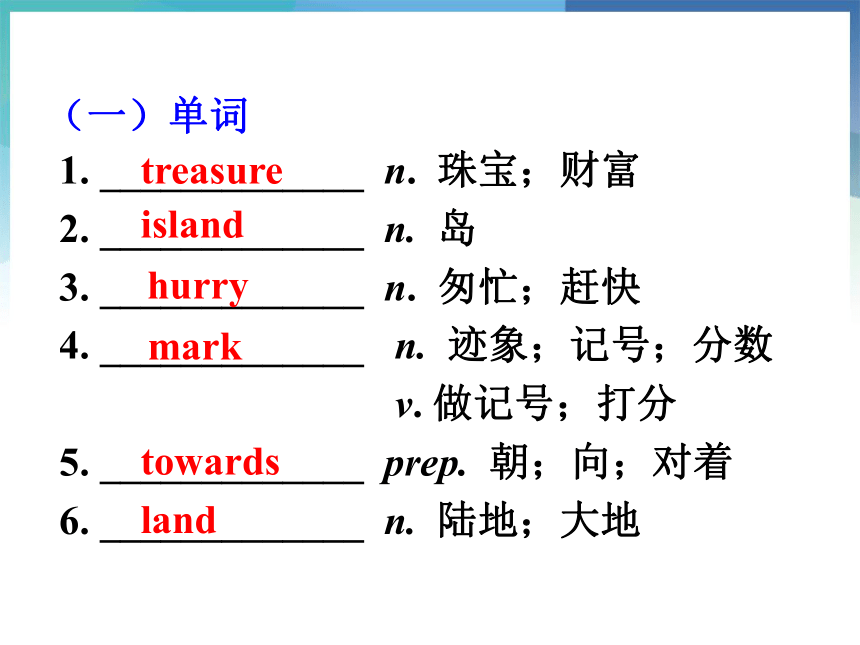
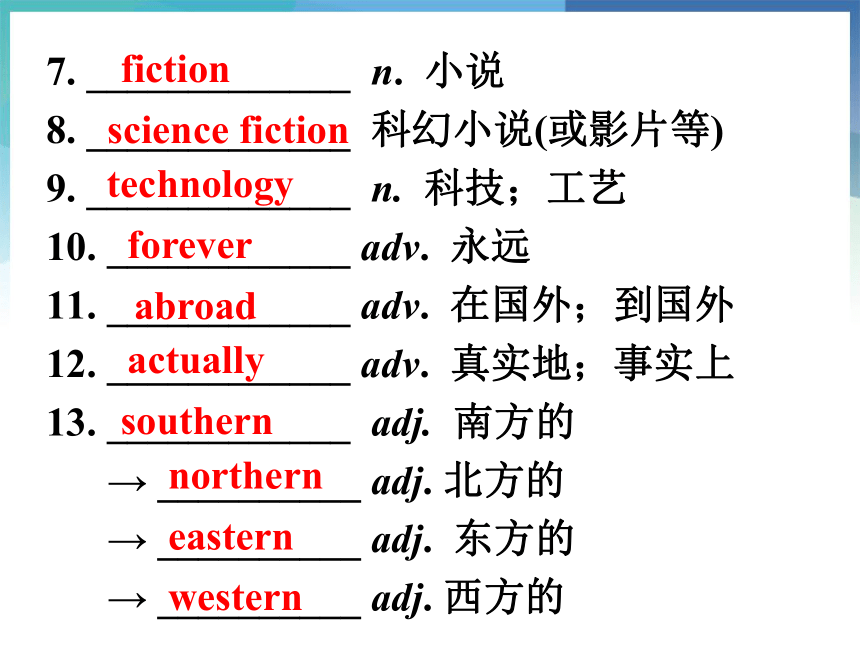
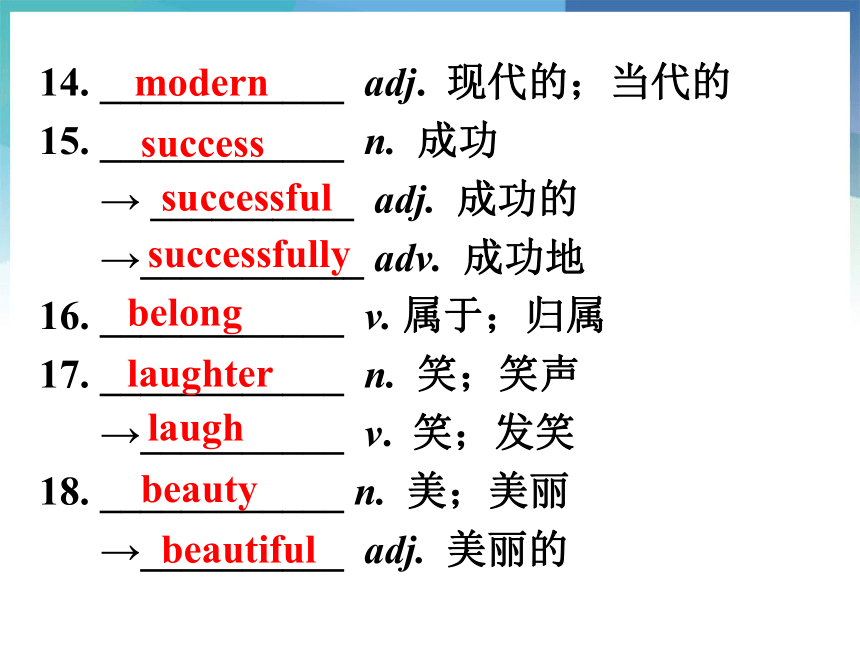
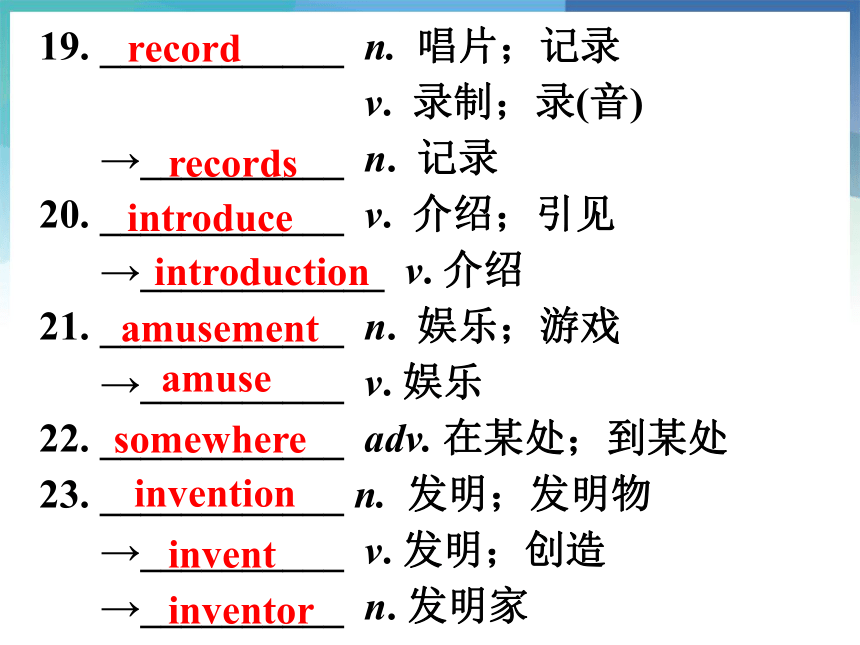
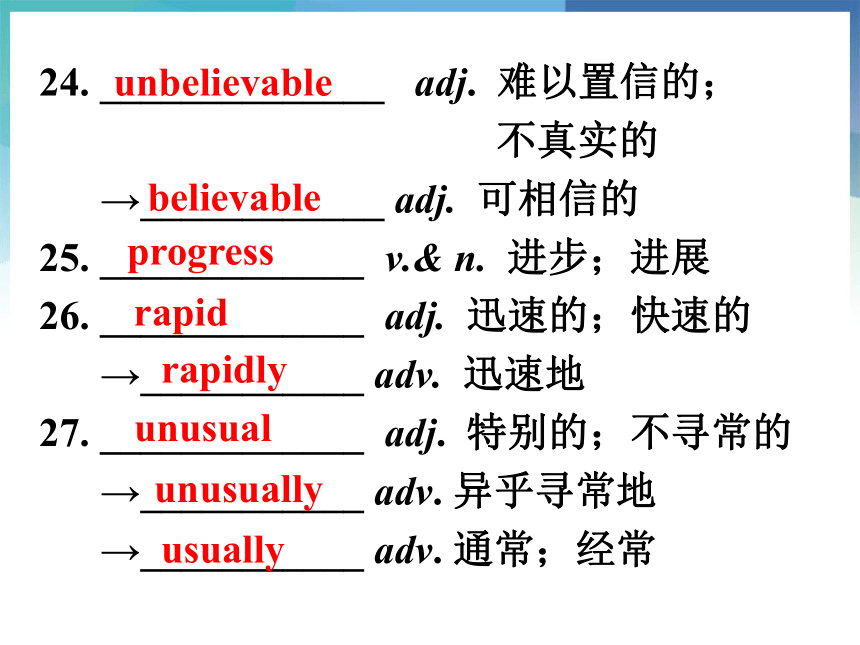
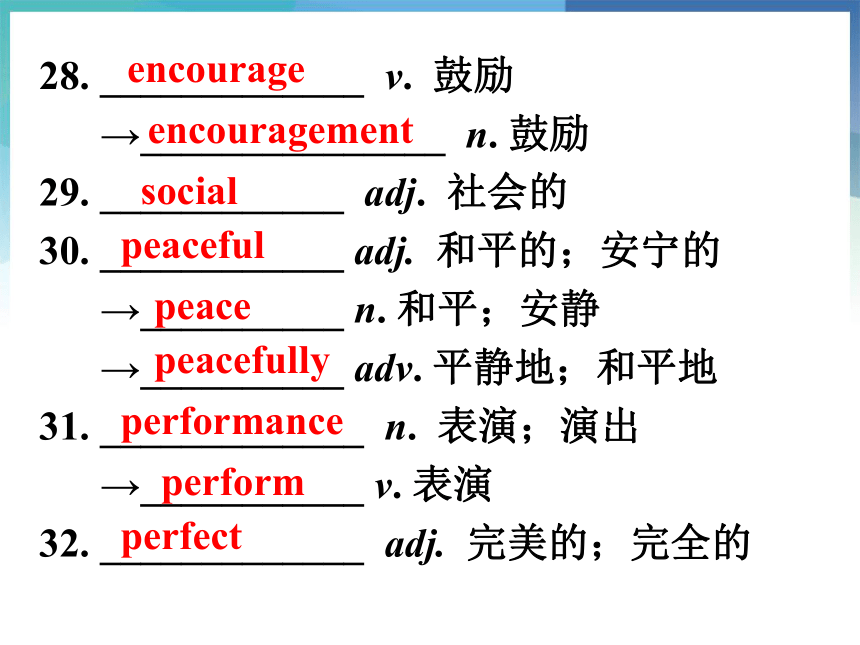
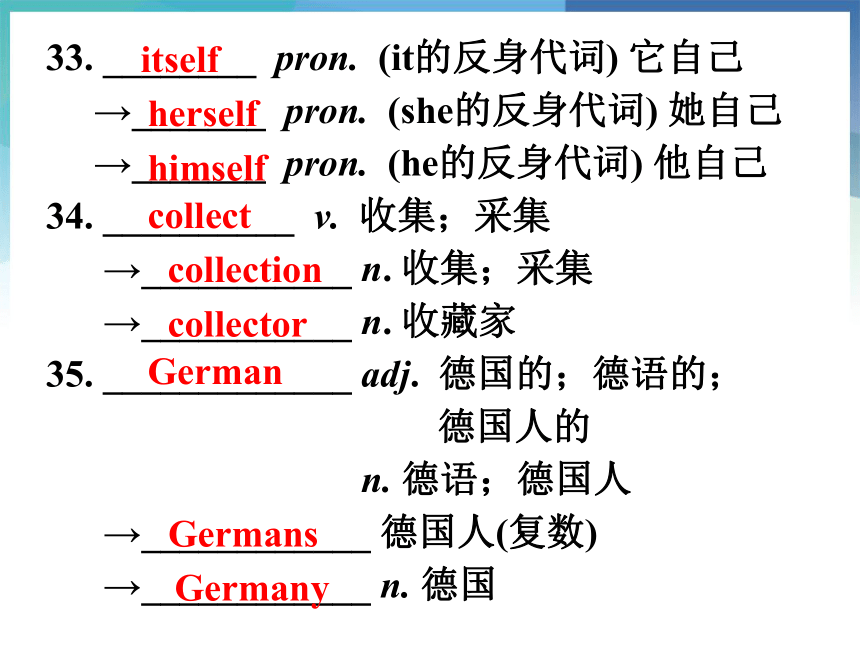
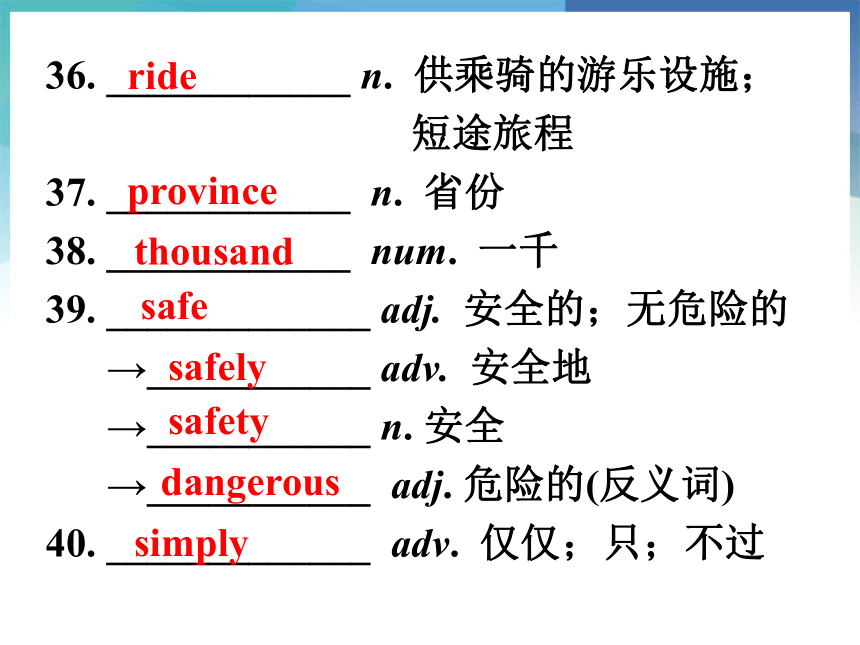
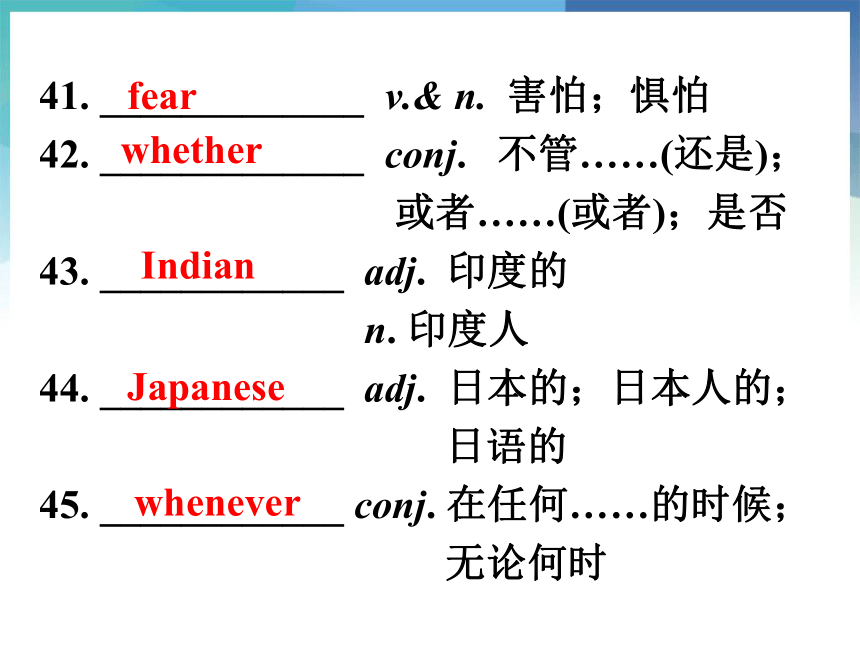
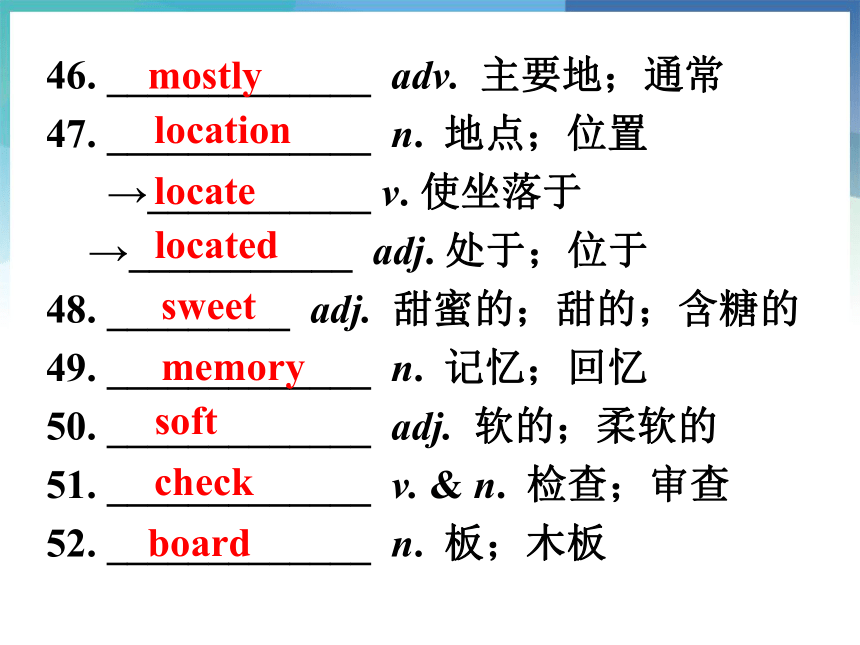
文档简介
1. _____________ n. 珠宝;财富
2. _____________ n. 岛
3. _____________ n. 匆忙;赶快
4. _____________ n. 迹象;记号;分数
v. 做记号;打分
5. _____________ prep. 朝;向;对着
6. _____________ n. 陆地;大地
(一)单词
treasure
island
towards
hurry
mark
land
7. _____________ n. 小说
8. _____________ 科幻小说(或影片等)
9. _____________ n. 科技;工艺
10. ____________ adv. 永远
11. ____________ adv. 在国外;到国外
12. ____________ adv. 真实地;事实上
13. ____________ adj. 南方的
→ __________ adj. 北方的
→ __________ adj. 东方的
→ __________ adj. 西方的
fiction
science fiction
technology
forever
abroad
actually
southern
northern
eastern
western
14. ____________ adj. 现代的;当代的
15. ____________ n. 成功
→ __________ adj. 成功的
→___________ adv. 成功地
16. ____________ v. 属于;归属
17. ____________ n. 笑;笑声
→__________ v. 笑;发笑
18. ____________ n. 美;美丽
→__________ adj. 美丽的
modern
successful
belong
beauty
beautiful
success
laughter
successfully
laugh
19. ____________ n. 唱片;记录
v. 录制;录(音)
→__________ n. 记录
20. ____________ v. 介绍;引见
→____________ v. 介绍
21. ____________ n. 娱乐;游戏
→__________ v. 娱乐
22. ____________ adv. 在某处;到某处
23. ____________ n. 发明;发明物
→__________ v. 发明;创造
→__________ n. 发明家
record
records
introduce
amusement
amuse
somewhere
invention
introduction
invent
inventor
24. ______________ adj. 难以置信的;
不真实的
→____________ adj. 可相信的
25. _____________ v.& n. 进步;进展
26. _____________ adj. 迅速的;快速的
→___________ adv. 迅速地
27. _____________ adj. 特别的;不寻常的
→___________ adv. 异乎寻常地
→___________ adv. 通常;经常
believable
rapid
rapidly
unusual
unusually
progress
unbelievable
usually
28. _____________ v. 鼓励
→_______________ n. 鼓励
29. ____________ adj. 社会的
30. ____________ adj. 和平的;安宁的
→__________ n. 和平;安静
→__________ adv. 平静地;和平地
31. _____________ n. 表演;演出
→___________ v. 表演
32. _____________ adj. 完美的;完全的
peaceful
peace
peacefully
performance
perform
encourage
encouragement
social
perfect
33. ________ pron. (it的反身代词) 它自己
→_______ pron. (she的反身代词) 她自己
→_______ pron. (he的反身代词) 他自己
34. __________ v. 收集;采集
→___________ n. 收集;采集
→___________ n. 收藏家
35. _____________ adj. 德国的;德语的;
德国人的
n. 德语;德国人
→____________ 德国人(复数)
→____________ n. 德国
itself
herself
himself
collect
collection
German
collector
Germans
Germany
36. ____________ n. 供乘骑的游乐设施;
短途旅程
37. ____________ n. 省份
38. ____________ num. 一千
39. _____________ adj. 安全的;无危险的
→___________ adv. 安全地
→___________ n. 安全
→___________ adj. 危险的(反义词)
40. _____________ adv. 仅仅;只;不过
province
thousand
safe
dangerous
ride
safely
safety
simply
41. _____________ v.& n. 害怕;惧怕
42. _____________ conj. 不管……(还是);
或者……(或者);是否
43. ____________ adj. 印度的
n. 印度人
44. ____________ adj. 日本的;日本人的;
日语的
45. ____________ conj. 在任何……的时候;
无论何时
fear
whether
Indian
whenever
Japanese
46. _____________ adv. 主要地;通常
47. _____________ n. 地点;位置
→___________ v. 使坐落于 →___________ adj. 处于;位于
48. _________ adj. 甜蜜的;甜的;含糖的
49. _____________ n. 记忆;回忆
50. _____________ adj. 软的;柔软的
51. _____________ v. & n. 检查;审查
52. _____________ n. 板;木板
mostly
location
sweet
locate
located
memory
soft
check
board
53. ____________ n. 铁路;铁道
54. ____________ v. 离开;分开
55. ____________ adj. 某种;某事;某人
确定的;肯定的
→____________ adv. 当然;一定
56. _____________ adj. 诚实的;老实的
→ __________ adj. 诚实的;真实的
(近义词)
→ __________ adj. 不诚实的(反义词)
57. _____________ n. 一段时间;一会儿
railway
part
certain
certainly
honest
dishonest
while
truthful
58. ____________ adv. 现今;现在;目前
59. ____________ v. & n. 搜索;搜查
60. ___________ prep. 在(其)中;……之一
61. ____________ n. 羞耻;羞愧;惭愧
62. _____________ v. 将……认为;
把……视为;看待
63. ____________ v. 数数
64. ____________ prep. 与……相对;
在……对面
adj. 对面的;另一边的
nowadays
search
among
shame
regard
count
opposite
65. ____________ adv. 尤其;特别;格外
→____________ adj. 特别的;特殊的
66. _____________ n. 童年;幼年
67. _____________ v. 注视;仔细考虑
→____________ n. 考虑;体贴
68. ____________ v. 拥有;抓住
→__________ 过去式/过去分词
especially
especial
childhood
consider
consideration
hold
held
1. _________________ 依据;按照
2. _________________ 两个;一对;几个
3. _________________?全年
4. _________________ 游乐场
5. _________________?至于;关于
6. _________________ 属于
7. _________________?棋类游戏
8. _________________?面包机
(二)短语
according to
a couple of?
all year round?
amusement park
as for?
belong to
board game?
bread maker?
9. __________________________?
唤起甜美的回忆
10. ___________________ 迫不及待地做某事
11. ___________________?察看;观察
12. ___________________?清理;丢掉
13. ___________________ 几乎;接近
14. ___________________?乡村音乐
15. ___________________?在白天
16. _____________________?鼓励某人做某事
bring back sweet memories
?
can’t wait to do sth.?
check out?
clear out?
close to?
country music?
during the daytime?
encourage sb. to do sth.?
17. ______________ 自从
18. ______________?一段时间
19. ______________ ?满是……的;
(有)大量的;(有)丰富的
20. ______________?赶快;急忙(做某事)
21. _________________ 初级中学
22. ______________ 导致
23. ______________了解;获知;得知
24. ______________?遗留;留下
25. ______________ ?丧生
ever since
for a while?
full of?
hurry up?
junior high school?
lead to?
learn about?
leave behind?
lose one’s life?
26. _______________?不再;不复
27. _________________________________?
一方面……另一方面……
28. _____________________ 互相
29. _______________? 放弃、交出(尤指不舍
得的东西)
30. _______________ 搭起
31. _______________?把……认为?/?视为……
32. _______________?科幻小说(或影片等)
33. _______________?搜寻
no longer?
on the one hand ... on the other hand ...?
one another / each other
part with?
put up?
regard ... as ...?
science fiction?
search for?
34. _____________?软体玩具;布绒玩具
35. _____________?度假
36. _____________?茶艺
37. _____________?茶具
38. _____________?成千上万的;许许多多的
39. _____________ 说实在的
40. _____________?庭院拍卖会
soft toy?
take a holiday?
tea art?
tea set?
thousands of?
to be honest
yard sale?
1. ... have / has + already +动词的过去分词? ...
……已经……了。
2. ... haven’t / hasn’t+动词的过去分词+yet.
……还没有……
3. Have / has ... ever / never been to ...?
……曾经?/?从来没有去过……吗?
4. It’s unbelievable that ...
……是难以置信的。
(三 )句型
5. sb. has problems (in) doing sth.
某人做某事有困难。
6. It seems +形容词+to do sth.
做某事似乎是……的。
7. This is the best time to do sth.
这是做某事的最佳时间。
8. How long have / has + ... +延续性动词的过去分词?...?
……已经……多长时间了?
9. ... have / has +延续性动词的过去分词?... +for+时间段.
……已经……长达……
10. ... have / has +延续性动词的过去分词?... +since +一般过去时的句子.
自从……,……就已经?/?一直……
1. hurry v. & n. 匆忙;赶快
归纳
hurry up 赶快;急忙(做某事)
in a hurry 迅速地,匆忙地
(一)单词
2. mark n. & v.
n. 记号 Roger’s horse has a white mark on its head.
n. 分数 My mark in English was A.??
v. 做标记;
标出 Mark the place on the map.
v. 打分 The teacher has marked the exam papers.
3. French n. 法语
German adj. 德国的;德语的;德国人的
n. 德国人;德语
拓展
Frenchman 法国人
Frenchmen 法国人(复数)
France 法国
Germans 德国人(复数)
Germany 德国
4. abroad adv. 在国外;到国外
aboard prep.
上船;上飞机;
上车
adv. 在船上;在火车上;在飞机上 e.g. Let’s go aboard
the plane now.
board n. 木板
v. 上船(或火
车、飞机等) on board在?(船、飞
机、车等)上
e.g. Flight BA 130
for?New York?is
now boarding at
Gate 15.
5. success n. 成功 (不可数)
成功的人或事 (可数)
拓展
successful adj. 成功的
successfully adv. 成功地
6. record n. 唱片;记录
v. 录制;录(音)
归纳
set a record 创造记录
break a record 打破记录
keep / hold a record 保持记录
keep a record of ...?把……记录下来
拓展
recorder n.? 录音机;录像机;记录员
recording n.? 录音;录像
7. introduce v. 介绍;引见
归纳
introduce sb. to sb. 把某人介绍给某人
introduce oneself? 做自我介绍
拓展
introduction n. 介绍
8. invent v. 发明;创造
invent discover
invent 意为“发明”,指发明或创造先前不曾存在的东西。
discover 意为“发现”,多指发现先前已经存在的东西。
9. progress n. & v. 进步;进展
归纳
make progress 取得进步
make good / great progress
取得很大进步
make progress in 在……方面取得进步
10. rapid adj. 迅速的;快速的
rapid fast? quick
rapid 正式用语,只用作形容词,语气较强,常用于表示抽象意义的“快速的”。
fast 可用作形容词,又可用作副词。它主要指人或物体本身的速度快或动作快。
quick 可用作形容词,又可用作副词。它既可指速度快,也可指反应快、动作敏捷。
请用rapid, fast或quick的适当形式完成下
列各题。
1) Our country has made ________ development.
2) Tom is ________ at learning English.
3) Don’t speak too ________. I can’t follow you.
4) The train is going _______ and _______.
rapid
quick?
fast?
faster faster
11. thousand num. 一千
归纳
one / two thousand 一千/ 两千
thousands of 数以千计的;许许多多的
拓展
thousands n. 数千
hundreds of 成百上千的;数以百计的
12. fear v. & n. 害怕;惧怕
归纳
fear to do. sth. 害怕做某事
in fear of 害怕,担心
拓展
fearful adj. 害怕的
fearless adj. 无所畏惧的
13. memory n. 记忆;回忆
归纳
in memory of 为了纪念
拓展
memorize ?v.?记住
memorial ?n.?纪念碑(或物)等;纪念品
memorable adj.? 值得纪念的;难忘的
14. own v. 拥有;有
adj. 自己的
常与形容词性物主代词连用
归纳
of one’s own 属于某人自己的
15. certain adj. 某种;某事;某人
归纳
be certain of / about 肯定会……;
对……有把握
be certain to do sth.? 肯定会做某事
链接
certain = sure adj. 确定的;肯定的
be / make certain = be / make sure
确定;有把握
16. search v. & n. 搜索;搜查
归纳
search for sth. (=look carefully for sth.)?
仔细寻找
search sb. for sth. (=search for sth. on sb.)搜某人身寻找某物
search for sb./sth.? 搜寻某人或某物
in search of 寻找
17. among prep. 在(其)中……;……之一
among between
among 一般用于三个或三个以上的人或物之间。
e.g. He was standing among a
group of children.
between
一般表示在两者之间,常用结构为between ... and ... (在……和……之间) 。
e.g. Peter sat between Mary and
Jane.
The bank is ______ the bookstore and the post office.
A. At the front of B. among
C. between
C
活学活用:
18. regard v. 将……认为;把……视为;
看待
归纳
regard ... as ... 将……视为……
regard with 看待;对……持某种态度
活学活用
当你遇到生活中的困难时,你应该把它们视为挑战。
When you meet problems in your life, you should ________ them _______ challenges.
regard as
19. consider v. 注视;仔细考虑
归纳
consider doing sth. 考虑做某事
consider sb. (to be) ...? 认为某人……
e.g. We all?consider him (to be)?the best
student in our class.
活学活用
—Walking more is good for our health.
—You’re right. So I’d rather ______ an
hour’s walk to work than consider
_____ a car.
A. take; driving B. take; drive
C. take; to drive D. to take; driving
A
20. hold v. 拥有;抓住
归纳
hold on 坚持;不要挂断电话;
抓住,保持
hold up 举起;耽搁
hold your tongue? 住嘴;不(要)说话
hold one’s breath?屏住呼吸;极其紧张;
提心吊胆
1. one another 互相
one another each other
(二)短语
one another 主要指三者或三都以上之间。
e.g. When the earthquake
happened, people there
helped one another.
each other
主要指两者之间。
e.g. Mary and I are good
friends. We always help each
other in our study.
2. at the end of 在……末尾/尽头
既可以表示在空间的“末端”,也可以表示时间的“结尾”。
拓展
in the end 终于;最后 =at last和finally
by the end of 不迟于。用于表示时间的场合
at the beginning of 在……开始
3. bring back 使回忆起;使想起;归还
拓展
bring down 使降低,击落;
bring in? 引进,提出
bring out? 出版,生产
bring?up 培养,抚养
4. part with 放弃、交出(尤指不舍得的东西)
拓展
for the most part? 大部分,通常;
in part? 部分地,在某种程度上;
play a(n) ... part in? 在……中起……的作
用,在……中扮演……的角色take part in? 参与,参加;
(三)句式
1. It made Sarah think about her family and friends back in the US.
make + 宾语 + 宾语补足语结构。
作宾语补足语的可以是不带to的不定式,也可以是名词、形容词或过去分词。
make +宾语+ n.
make +宾语+ adj.
make +宾语+ 过去分词
e.g. We made him our monitor.
The good news made us very happy.
He couldn’t make himself heard above
the noise of the traffic.
2. Ever since then, she has been a fan of American country music.
ever since 自从
ever since then 从那以后
是现在完成时的标志之一。
3. – Have you ever been to a science museum?
– Yes, I have.
have been to 去过某地
have been in 在某地待多长时间了(与
since,for,how long等连用)
have gone to 去某地了(不在说话地点,
可能在去的途中或在目的地)
4. -- Have you ever been to a history museum?
-- No. I haven’t.
-- Me neither.
Me neither = Neither have I.
用于描述前面叙述的否定情况也同样适用于后者。
5. It’s unbelievable that technology has progressed in such a rapid way!
It’s unbelievable that ...
……是难以置信的。
it是形式主语,真正的主语是其后的that从句。
6. Whether you like Indian food, Western food or Japanese food, you’ll find it all in Singapore!
whether…or… (不管……还是……)
用来连接并列选择部分。
e.g. Whether sick or well, she is always
cheerful.
7. I’ve had it for three years.
for three years是表示时间段的短语,通常和现在完成时搭配。
“for+时间段”和 “since+时间段+ago”是同义表达。
e.g. I have worked in the factory for two
years. =
I have worked in the factory since two
years ago.
现在完成时 (Units 8&9&10)
一、构成
现在完成时由“助动词have / has +动词的过去分词”构成。
二、用法
1.?表示过去发生或已经完成的某一动作对现在造成的影响或结果。
常见的时态标志词有already (常用于肯定句), yet (用于否定句和一般疑问句), just, ever, never, before, so far等。如:
Susan has already watched the TV play.
—Have you found your new book yet?
—No. I haven’t found it yet.
My grandparents have ever traveled by plane.
Tim hasn’t heard of it before.
2.?表示动作或状态在过去已经开始,持续到现在,也许还要持续下去,该用法常适用于延续性动词。常见的时态标志词有since和for。
▲since意为“自从……”,它既可作介词,也可作连词。作介词时,后接过去的时间点,表示某事开始的时间;作连词时,引导时间状语从句,从句常用一般过去时。
如:
My sister has been a teacher since two years ago.
The Smiths have worked there since they moved to the city.
▲for作介词,后接一段时间,表示一种状况已经持续了多长时间。如:
They have lived in the house for eight years.
▲另外,对since和for引导的时间状语(从句)提问时常用how long。如:
I have stayed in this city?for ten days. ?(对划线部分提问)
→How long have you stayed in this city?
动词的时态(现在完成时、一般过去时、一般将来时)专练
从A、B、C(、D)三或四个选项中选择可以填入空白处的最佳答案。
1. Sarah _____ many places of interest in Beijing already.
A. visited B. has visited
C. will visit D. visits (2018 辽宁沈阳)
B
2. —Where?is?Mr.?Brown?
— He ______ Australia. He ____?there
last?year.
A.?has?been?to,?has?been?
B.?has?been?to,?has?gone?
C.?has gone?to,?went?
D. went,?went
(2018 贵州铜仁)
C
3. —Has your daughter come back from
Australia?
—Yes. She ____there for three years
A. has stayed B. stays
C. stayed D. had stayed
(2018 内蒙古包头)
C
4. — It’s said all the train tickets during
the holidays were sold out.
—Don’t worry. I ______ two for us.
A. get B. got C. have got
(2018 青海)
C
5. —When will you give the novel back to me?
— Sorry, I ______ it. How about Friday?
A. didn’t finish B. won’t finish
C. haven’t finished D. don’t finish
(2018 山东日照)
C
6. We ____ a party for Kate. It's supposed to be a surprise.
A. were having B. had
C. will have D. have had
(2018 江西)
C
7. Diana can’ t go to the farm with her classmates because she ______ a bad cold.
A. will catch B. is catching
C. has caught D. is caught
(2018 内蒙古呼和浩特)
C
一、时间(Time)
时段(Duration)
*A: How long have you been in this company?
B: For ten years.
*A: How long have you played football?
B: Since I was four years old.
*A: How long are you staying in New York?
B: For a month.
*A: How long does it take you to walk there?
B: About 40 minutes.
*A: When did Mr. White live in Beijing?
B: From 2010 to 2017.
二、情感(Emotions)
遗憾(Regret)
*A: I was caught in a heavy rain and got a bad
cold.
B: I’m sorry to hear that.
*A: Jim was going to pick you up, but his car
broke down.
B: What a pity / shame!
*A: My mother lost her mobile phone on the bus yesterday.
B: It’s / That’s a pity / shame.
*A: The works of art on show were beautiful.
B: That’s true. But it’s a pity that we weren’t allowed to take photographs in the museum.
情感与情绪——情感
【写作任务】(改编自2017重庆A卷书面表达)
在过去的日子里,我们曾经欢笑,也曾经哭泣……照片,或将这些精彩定格,或勾起你对往事的回忆。某英语网站向你发出邀请,请你按要求用英语写一篇文章,分享你照片背后的故事。
要求:
1.?故事必须原创;
2. 80-120词,开头已给出,不计入总词数;
3.?文中不能出现自己的姓名和所在学校的名称。
参考要点:
1.?描述你的照片(时间,地点,人物……);
2.?分享你的故事(起因,经过,结果……);
3.?谈谈你的感受(感动,怀念,影响……)。
【思路点拨】
1.?定基调
体裁:记叙文??????
时态:以一般过去时为主??????
人称:第一人称和第三人称
2.?列提纲、写句子
my dad and I are playing ping-pong / table tennis happily
列提纲 写句子
描述照片 (1) In the photo, _____________________________________________________ (我和爸爸正在开心地打乒乓球).
I was 10 and my dad looked young.
I was a ping-pong / table tennis player before
My dad was tired after a day’s work
?I felt so sad that I wanted to give up
The next morning, I found a small piece of paper
分享故事 (2) ___________________________________
________ (我曾经是一名乒乓球运动员).
(3) ________________________________ (一天的工作之后,我爸爸很累).
My dad trained me so hard.
Once, I lost a game.
(4) ______________________________ (我觉得很伤心,以至于想放弃).
My dad said nothing, and he just sat quietly beside me.
(5) __________________________________
__________ (第二天早上,我发现了一张纸条). It said, “Never give up, dear. I’m proud of you!”
?I will never forget what my dad told me
I won’t disappoint my dad / let my dad down
谈谈感受 (6) ______________________________
________ (我永远不会忘记爸爸告诉我的话).
My dad is proud of me, so whatever I do I will try my best.
(7) ______________________________
__________ (我不会让爸爸失望).
3.?巧衔接
(1)?成文时,可将一些意义相关的句子通过一定的词连接起来,使其有更强的逻辑性,如表示让步的though,表示并列的and和表示转折的but。
(2)?分享完照片背后的故事后,要引入新的话题(谈谈感受),可以使用Now, I spend less time playing ping-pong because I’m busy with my studies来作为插入语,以补足句意。
4.?成篇章
This is a photo that is very special to me. In the photo, _______________________________
________________________________________________________________________________________________________________________________________________________________
________________________________________________________________________________
________________________________________________________________________________
happily. I was 10 and my dad looked young.
my dad and I are playing ping-pong
I used to be a ping-pong player. My dad trained me so hard,?though?he was tired after a day’s work. Once, I lost a game and I felt so sad that I wanted to give up. My dad said nothing,?and?he just sat quietly beside me. The next morning, I found a small piece of paper. It said, “Never give up, dear. I’m proud of you!”
_______________________________________________________________________________________________________________________________________________________________________________________
Now, I spend less time playing ping-pong because I’m busy with my studies. But?I will never forget what my dad told me. He is proud of me, so whatever I do I will try my best. I won’t disappoint my dad.
Ⅰ.?根据句意及所给首字母提示,补全句中所缺单词。
1. Dave?o?????????????????his house. He didn’t rent (租借) it.
2. Sara?i???????????? ?????me to an Indian girl at last night’s party.
3. There is an English saying, “L?????????????????is the best medicine.”
owned
?introduced
Laughter
4. There was no wind, and the surface of the lake looked so?p????????????????.
5. —Have you finished reading the book, Peter?
—No. I still have a few more?p?????????????????to read.
6. Tony was too heavy and was advised not to eat chocolate, cakes or other?s?????????????????foods.
peaceful?
pages
sweet
Ⅱ. 根据汉语意思完成句子,每空一词。
1.?在工作中我们应该互相帮助。
We should ________ ________ ________ in our work.
2.?我有几天没看到James了。
I haven’t seen James for ________ ________ _________ _________.
3.?察看一下所有的儿童书籍。
_________ _________ all the books for children.?
help each other
a
?Check out?
couple of days?
4.?我的家乡全年暖和。
It is warm in my hometown _________ _________ _________.
5.?至于业余爱好,Nancy喜欢旅行和唱歌。
________ ________ ________, Nancy likes traveling and singing.
6.?这个城市的人口接近一百万。
The population of this city is _________ ________ _________ _________.
year round
As for hobbies
to a / one million?
all
close
III. 根据汉语意思及括号内所给提示语,将下列句子翻译成英语。
1.?快点,否则我们会迟到的。?(hurry up)
__________________________________
2. Molly不再是一个音乐爱好者。?(no longer)
___________________________________
3. 说实在的,Frank根本不会打篮球。?(to be honest)
_____________________________________
_________
Hurry up, or we’ll be late.
Molly is no longer a music lover.
To be honest, Frank can’t play basketball at all.
4.?根据学校的规定,我们不能在教室里吃东西。?(according to)
_____________________________________
________________________
5.?我迫不及待想要去参加你的派对。?(can’t wait)
_____________________________________
6.?自从Mario毕业后就在这个城市工作。?(ever since)
_____________________________________
_____________
According to the school rule, we can’t eat food in the classroom.
I can’t wait to go to your party.
Mario has worked in this city ever since he left school.
Ⅳ. 根据语境及括号内所给动词的提示填空。
1. —May I have the key to Room 425, please? I
want to have a rest in it.
— Of course, we _________ (tidy) it up
already. Here you are. (2017?江苏常州)
2. Sandy’s grandparents ________________
(marry) for 50 years. ? (2017?湖北鄂州)
3. I ____________ (wash) the dishes while my
sister was sweeping the floor.? (2017?江苏宿迁)
have tidied
have been married?
was washing
Ⅴ. 根据对话内容,在空白处填入恰当的句
子,使对话完整、通顺。
A: Hi, Wendy! Long time no see.
B: Hi, Eliza! I’ve just come back from China.
A: (1) ______________________________?
B: For about half a year.
A: (2) ______________________________?
B: Everything was strange at first. Many
customs are different from ours.
How long did you stay there
What do you think of staying there
A: But your Chinese must have improved a lot.
B: (3) _________________________________. I couldn’t understand much at first, but later I got used to speaking Chinese.
A: (4) ______________________________?
B: I lived with a host family.
A: That’s great! Oh, my mom is calling me. I have to go.
B: OK. (5)______________________________.
Sure / Of course it has improved a lot
Who did you live with there
See you (later)
2. _____________ n. 岛
3. _____________ n. 匆忙;赶快
4. _____________ n. 迹象;记号;分数
v. 做记号;打分
5. _____________ prep. 朝;向;对着
6. _____________ n. 陆地;大地
(一)单词
treasure
island
towards
hurry
mark
land
7. _____________ n. 小说
8. _____________ 科幻小说(或影片等)
9. _____________ n. 科技;工艺
10. ____________ adv. 永远
11. ____________ adv. 在国外;到国外
12. ____________ adv. 真实地;事实上
13. ____________ adj. 南方的
→ __________ adj. 北方的
→ __________ adj. 东方的
→ __________ adj. 西方的
fiction
science fiction
technology
forever
abroad
actually
southern
northern
eastern
western
14. ____________ adj. 现代的;当代的
15. ____________ n. 成功
→ __________ adj. 成功的
→___________ adv. 成功地
16. ____________ v. 属于;归属
17. ____________ n. 笑;笑声
→__________ v. 笑;发笑
18. ____________ n. 美;美丽
→__________ adj. 美丽的
modern
successful
belong
beauty
beautiful
success
laughter
successfully
laugh
19. ____________ n. 唱片;记录
v. 录制;录(音)
→__________ n. 记录
20. ____________ v. 介绍;引见
→____________ v. 介绍
21. ____________ n. 娱乐;游戏
→__________ v. 娱乐
22. ____________ adv. 在某处;到某处
23. ____________ n. 发明;发明物
→__________ v. 发明;创造
→__________ n. 发明家
record
records
introduce
amusement
amuse
somewhere
invention
introduction
invent
inventor
24. ______________ adj. 难以置信的;
不真实的
→____________ adj. 可相信的
25. _____________ v.& n. 进步;进展
26. _____________ adj. 迅速的;快速的
→___________ adv. 迅速地
27. _____________ adj. 特别的;不寻常的
→___________ adv. 异乎寻常地
→___________ adv. 通常;经常
believable
rapid
rapidly
unusual
unusually
progress
unbelievable
usually
28. _____________ v. 鼓励
→_______________ n. 鼓励
29. ____________ adj. 社会的
30. ____________ adj. 和平的;安宁的
→__________ n. 和平;安静
→__________ adv. 平静地;和平地
31. _____________ n. 表演;演出
→___________ v. 表演
32. _____________ adj. 完美的;完全的
peaceful
peace
peacefully
performance
perform
encourage
encouragement
social
perfect
33. ________ pron. (it的反身代词) 它自己
→_______ pron. (she的反身代词) 她自己
→_______ pron. (he的反身代词) 他自己
34. __________ v. 收集;采集
→___________ n. 收集;采集
→___________ n. 收藏家
35. _____________ adj. 德国的;德语的;
德国人的
n. 德语;德国人
→____________ 德国人(复数)
→____________ n. 德国
itself
herself
himself
collect
collection
German
collector
Germans
Germany
36. ____________ n. 供乘骑的游乐设施;
短途旅程
37. ____________ n. 省份
38. ____________ num. 一千
39. _____________ adj. 安全的;无危险的
→___________ adv. 安全地
→___________ n. 安全
→___________ adj. 危险的(反义词)
40. _____________ adv. 仅仅;只;不过
province
thousand
safe
dangerous
ride
safely
safety
simply
41. _____________ v.& n. 害怕;惧怕
42. _____________ conj. 不管……(还是);
或者……(或者);是否
43. ____________ adj. 印度的
n. 印度人
44. ____________ adj. 日本的;日本人的;
日语的
45. ____________ conj. 在任何……的时候;
无论何时
fear
whether
Indian
whenever
Japanese
46. _____________ adv. 主要地;通常
47. _____________ n. 地点;位置
→___________ v. 使坐落于 →___________ adj. 处于;位于
48. _________ adj. 甜蜜的;甜的;含糖的
49. _____________ n. 记忆;回忆
50. _____________ adj. 软的;柔软的
51. _____________ v. & n. 检查;审查
52. _____________ n. 板;木板
mostly
location
sweet
locate
located
memory
soft
check
board
53. ____________ n. 铁路;铁道
54. ____________ v. 离开;分开
55. ____________ adj. 某种;某事;某人
确定的;肯定的
→____________ adv. 当然;一定
56. _____________ adj. 诚实的;老实的
→ __________ adj. 诚实的;真实的
(近义词)
→ __________ adj. 不诚实的(反义词)
57. _____________ n. 一段时间;一会儿
railway
part
certain
certainly
honest
dishonest
while
truthful
58. ____________ adv. 现今;现在;目前
59. ____________ v. & n. 搜索;搜查
60. ___________ prep. 在(其)中;……之一
61. ____________ n. 羞耻;羞愧;惭愧
62. _____________ v. 将……认为;
把……视为;看待
63. ____________ v. 数数
64. ____________ prep. 与……相对;
在……对面
adj. 对面的;另一边的
nowadays
search
among
shame
regard
count
opposite
65. ____________ adv. 尤其;特别;格外
→____________ adj. 特别的;特殊的
66. _____________ n. 童年;幼年
67. _____________ v. 注视;仔细考虑
→____________ n. 考虑;体贴
68. ____________ v. 拥有;抓住
→__________ 过去式/过去分词
especially
especial
childhood
consider
consideration
hold
held
1. _________________ 依据;按照
2. _________________ 两个;一对;几个
3. _________________?全年
4. _________________ 游乐场
5. _________________?至于;关于
6. _________________ 属于
7. _________________?棋类游戏
8. _________________?面包机
(二)短语
according to
a couple of?
all year round?
amusement park
as for?
belong to
board game?
bread maker?
9. __________________________?
唤起甜美的回忆
10. ___________________ 迫不及待地做某事
11. ___________________?察看;观察
12. ___________________?清理;丢掉
13. ___________________ 几乎;接近
14. ___________________?乡村音乐
15. ___________________?在白天
16. _____________________?鼓励某人做某事
bring back sweet memories
?
can’t wait to do sth.?
check out?
clear out?
close to?
country music?
during the daytime?
encourage sb. to do sth.?
17. ______________ 自从
18. ______________?一段时间
19. ______________ ?满是……的;
(有)大量的;(有)丰富的
20. ______________?赶快;急忙(做某事)
21. _________________ 初级中学
22. ______________ 导致
23. ______________了解;获知;得知
24. ______________?遗留;留下
25. ______________ ?丧生
ever since
for a while?
full of?
hurry up?
junior high school?
lead to?
learn about?
leave behind?
lose one’s life?
26. _______________?不再;不复
27. _________________________________?
一方面……另一方面……
28. _____________________ 互相
29. _______________? 放弃、交出(尤指不舍
得的东西)
30. _______________ 搭起
31. _______________?把……认为?/?视为……
32. _______________?科幻小说(或影片等)
33. _______________?搜寻
no longer?
on the one hand ... on the other hand ...?
one another / each other
part with?
put up?
regard ... as ...?
science fiction?
search for?
34. _____________?软体玩具;布绒玩具
35. _____________?度假
36. _____________?茶艺
37. _____________?茶具
38. _____________?成千上万的;许许多多的
39. _____________ 说实在的
40. _____________?庭院拍卖会
soft toy?
take a holiday?
tea art?
tea set?
thousands of?
to be honest
yard sale?
1. ... have / has + already +动词的过去分词? ...
……已经……了。
2. ... haven’t / hasn’t+动词的过去分词+yet.
……还没有……
3. Have / has ... ever / never been to ...?
……曾经?/?从来没有去过……吗?
4. It’s unbelievable that ...
……是难以置信的。
(三 )句型
5. sb. has problems (in) doing sth.
某人做某事有困难。
6. It seems +形容词+to do sth.
做某事似乎是……的。
7. This is the best time to do sth.
这是做某事的最佳时间。
8. How long have / has + ... +延续性动词的过去分词?...?
……已经……多长时间了?
9. ... have / has +延续性动词的过去分词?... +for+时间段.
……已经……长达……
10. ... have / has +延续性动词的过去分词?... +since +一般过去时的句子.
自从……,……就已经?/?一直……
1. hurry v. & n. 匆忙;赶快
归纳
hurry up 赶快;急忙(做某事)
in a hurry 迅速地,匆忙地
(一)单词
2. mark n. & v.
n. 记号 Roger’s horse has a white mark on its head.
n. 分数 My mark in English was A.??
v. 做标记;
标出 Mark the place on the map.
v. 打分 The teacher has marked the exam papers.
3. French n. 法语
German adj. 德国的;德语的;德国人的
n. 德国人;德语
拓展
Frenchman 法国人
Frenchmen 法国人(复数)
France 法国
Germans 德国人(复数)
Germany 德国
4. abroad adv. 在国外;到国外
aboard prep.
上船;上飞机;
上车
adv. 在船上;在火车上;在飞机上 e.g. Let’s go aboard
the plane now.
board n. 木板
v. 上船(或火
车、飞机等) on board在?(船、飞
机、车等)上
e.g. Flight BA 130
for?New York?is
now boarding at
Gate 15.
5. success n. 成功 (不可数)
成功的人或事 (可数)
拓展
successful adj. 成功的
successfully adv. 成功地
6. record n. 唱片;记录
v. 录制;录(音)
归纳
set a record 创造记录
break a record 打破记录
keep / hold a record 保持记录
keep a record of ...?把……记录下来
拓展
recorder n.? 录音机;录像机;记录员
recording n.? 录音;录像
7. introduce v. 介绍;引见
归纳
introduce sb. to sb. 把某人介绍给某人
introduce oneself? 做自我介绍
拓展
introduction n. 介绍
8. invent v. 发明;创造
invent discover
invent 意为“发明”,指发明或创造先前不曾存在的东西。
discover 意为“发现”,多指发现先前已经存在的东西。
9. progress n. & v. 进步;进展
归纳
make progress 取得进步
make good / great progress
取得很大进步
make progress in 在……方面取得进步
10. rapid adj. 迅速的;快速的
rapid fast? quick
rapid 正式用语,只用作形容词,语气较强,常用于表示抽象意义的“快速的”。
fast 可用作形容词,又可用作副词。它主要指人或物体本身的速度快或动作快。
quick 可用作形容词,又可用作副词。它既可指速度快,也可指反应快、动作敏捷。
请用rapid, fast或quick的适当形式完成下
列各题。
1) Our country has made ________ development.
2) Tom is ________ at learning English.
3) Don’t speak too ________. I can’t follow you.
4) The train is going _______ and _______.
rapid
quick?
fast?
faster faster
11. thousand num. 一千
归纳
one / two thousand 一千/ 两千
thousands of 数以千计的;许许多多的
拓展
thousands n. 数千
hundreds of 成百上千的;数以百计的
12. fear v. & n. 害怕;惧怕
归纳
fear to do. sth. 害怕做某事
in fear of 害怕,担心
拓展
fearful adj. 害怕的
fearless adj. 无所畏惧的
13. memory n. 记忆;回忆
归纳
in memory of 为了纪念
拓展
memorize ?v.?记住
memorial ?n.?纪念碑(或物)等;纪念品
memorable adj.? 值得纪念的;难忘的
14. own v. 拥有;有
adj. 自己的
常与形容词性物主代词连用
归纳
of one’s own 属于某人自己的
15. certain adj. 某种;某事;某人
归纳
be certain of / about 肯定会……;
对……有把握
be certain to do sth.? 肯定会做某事
链接
certain = sure adj. 确定的;肯定的
be / make certain = be / make sure
确定;有把握
16. search v. & n. 搜索;搜查
归纳
search for sth. (=look carefully for sth.)?
仔细寻找
search sb. for sth. (=search for sth. on sb.)搜某人身寻找某物
search for sb./sth.? 搜寻某人或某物
in search of 寻找
17. among prep. 在(其)中……;……之一
among between
among 一般用于三个或三个以上的人或物之间。
e.g. He was standing among a
group of children.
between
一般表示在两者之间,常用结构为between ... and ... (在……和……之间) 。
e.g. Peter sat between Mary and
Jane.
The bank is ______ the bookstore and the post office.
A. At the front of B. among
C. between
C
活学活用:
18. regard v. 将……认为;把……视为;
看待
归纳
regard ... as ... 将……视为……
regard with 看待;对……持某种态度
活学活用
当你遇到生活中的困难时,你应该把它们视为挑战。
When you meet problems in your life, you should ________ them _______ challenges.
regard as
19. consider v. 注视;仔细考虑
归纳
consider doing sth. 考虑做某事
consider sb. (to be) ...? 认为某人……
e.g. We all?consider him (to be)?the best
student in our class.
活学活用
—Walking more is good for our health.
—You’re right. So I’d rather ______ an
hour’s walk to work than consider
_____ a car.
A. take; driving B. take; drive
C. take; to drive D. to take; driving
A
20. hold v. 拥有;抓住
归纳
hold on 坚持;不要挂断电话;
抓住,保持
hold up 举起;耽搁
hold your tongue? 住嘴;不(要)说话
hold one’s breath?屏住呼吸;极其紧张;
提心吊胆
1. one another 互相
one another each other
(二)短语
one another 主要指三者或三都以上之间。
e.g. When the earthquake
happened, people there
helped one another.
each other
主要指两者之间。
e.g. Mary and I are good
friends. We always help each
other in our study.
2. at the end of 在……末尾/尽头
既可以表示在空间的“末端”,也可以表示时间的“结尾”。
拓展
in the end 终于;最后 =at last和finally
by the end of 不迟于。用于表示时间的场合
at the beginning of 在……开始
3. bring back 使回忆起;使想起;归还
拓展
bring down 使降低,击落;
bring in? 引进,提出
bring out? 出版,生产
bring?up 培养,抚养
4. part with 放弃、交出(尤指不舍得的东西)
拓展
for the most part? 大部分,通常;
in part? 部分地,在某种程度上;
play a(n) ... part in? 在……中起……的作
用,在……中扮演……的角色take part in? 参与,参加;
(三)句式
1. It made Sarah think about her family and friends back in the US.
make + 宾语 + 宾语补足语结构。
作宾语补足语的可以是不带to的不定式,也可以是名词、形容词或过去分词。
make +宾语+ n.
make +宾语+ adj.
make +宾语+ 过去分词
e.g. We made him our monitor.
The good news made us very happy.
He couldn’t make himself heard above
the noise of the traffic.
2. Ever since then, she has been a fan of American country music.
ever since 自从
ever since then 从那以后
是现在完成时的标志之一。
3. – Have you ever been to a science museum?
– Yes, I have.
have been to 去过某地
have been in 在某地待多长时间了(与
since,for,how long等连用)
have gone to 去某地了(不在说话地点,
可能在去的途中或在目的地)
4. -- Have you ever been to a history museum?
-- No. I haven’t.
-- Me neither.
Me neither = Neither have I.
用于描述前面叙述的否定情况也同样适用于后者。
5. It’s unbelievable that technology has progressed in such a rapid way!
It’s unbelievable that ...
……是难以置信的。
it是形式主语,真正的主语是其后的that从句。
6. Whether you like Indian food, Western food or Japanese food, you’ll find it all in Singapore!
whether…or… (不管……还是……)
用来连接并列选择部分。
e.g. Whether sick or well, she is always
cheerful.
7. I’ve had it for three years.
for three years是表示时间段的短语,通常和现在完成时搭配。
“for+时间段”和 “since+时间段+ago”是同义表达。
e.g. I have worked in the factory for two
years. =
I have worked in the factory since two
years ago.
现在完成时 (Units 8&9&10)
一、构成
现在完成时由“助动词have / has +动词的过去分词”构成。
二、用法
1.?表示过去发生或已经完成的某一动作对现在造成的影响或结果。
常见的时态标志词有already (常用于肯定句), yet (用于否定句和一般疑问句), just, ever, never, before, so far等。如:
Susan has already watched the TV play.
—Have you found your new book yet?
—No. I haven’t found it yet.
My grandparents have ever traveled by plane.
Tim hasn’t heard of it before.
2.?表示动作或状态在过去已经开始,持续到现在,也许还要持续下去,该用法常适用于延续性动词。常见的时态标志词有since和for。
▲since意为“自从……”,它既可作介词,也可作连词。作介词时,后接过去的时间点,表示某事开始的时间;作连词时,引导时间状语从句,从句常用一般过去时。
如:
My sister has been a teacher since two years ago.
The Smiths have worked there since they moved to the city.
▲for作介词,后接一段时间,表示一种状况已经持续了多长时间。如:
They have lived in the house for eight years.
▲另外,对since和for引导的时间状语(从句)提问时常用how long。如:
I have stayed in this city?for ten days. ?(对划线部分提问)
→How long have you stayed in this city?
动词的时态(现在完成时、一般过去时、一般将来时)专练
从A、B、C(、D)三或四个选项中选择可以填入空白处的最佳答案。
1. Sarah _____ many places of interest in Beijing already.
A. visited B. has visited
C. will visit D. visits (2018 辽宁沈阳)
B
2. —Where?is?Mr.?Brown?
— He ______ Australia. He ____?there
last?year.
A.?has?been?to,?has?been?
B.?has?been?to,?has?gone?
C.?has gone?to,?went?
D. went,?went
(2018 贵州铜仁)
C
3. —Has your daughter come back from
Australia?
—Yes. She ____there for three years
A. has stayed B. stays
C. stayed D. had stayed
(2018 内蒙古包头)
C
4. — It’s said all the train tickets during
the holidays were sold out.
—Don’t worry. I ______ two for us.
A. get B. got C. have got
(2018 青海)
C
5. —When will you give the novel back to me?
— Sorry, I ______ it. How about Friday?
A. didn’t finish B. won’t finish
C. haven’t finished D. don’t finish
(2018 山东日照)
C
6. We ____ a party for Kate. It's supposed to be a surprise.
A. were having B. had
C. will have D. have had
(2018 江西)
C
7. Diana can’ t go to the farm with her classmates because she ______ a bad cold.
A. will catch B. is catching
C. has caught D. is caught
(2018 内蒙古呼和浩特)
C
一、时间(Time)
时段(Duration)
*A: How long have you been in this company?
B: For ten years.
*A: How long have you played football?
B: Since I was four years old.
*A: How long are you staying in New York?
B: For a month.
*A: How long does it take you to walk there?
B: About 40 minutes.
*A: When did Mr. White live in Beijing?
B: From 2010 to 2017.
二、情感(Emotions)
遗憾(Regret)
*A: I was caught in a heavy rain and got a bad
cold.
B: I’m sorry to hear that.
*A: Jim was going to pick you up, but his car
broke down.
B: What a pity / shame!
*A: My mother lost her mobile phone on the bus yesterday.
B: It’s / That’s a pity / shame.
*A: The works of art on show were beautiful.
B: That’s true. But it’s a pity that we weren’t allowed to take photographs in the museum.
情感与情绪——情感
【写作任务】(改编自2017重庆A卷书面表达)
在过去的日子里,我们曾经欢笑,也曾经哭泣……照片,或将这些精彩定格,或勾起你对往事的回忆。某英语网站向你发出邀请,请你按要求用英语写一篇文章,分享你照片背后的故事。
要求:
1.?故事必须原创;
2. 80-120词,开头已给出,不计入总词数;
3.?文中不能出现自己的姓名和所在学校的名称。
参考要点:
1.?描述你的照片(时间,地点,人物……);
2.?分享你的故事(起因,经过,结果……);
3.?谈谈你的感受(感动,怀念,影响……)。
【思路点拨】
1.?定基调
体裁:记叙文??????
时态:以一般过去时为主??????
人称:第一人称和第三人称
2.?列提纲、写句子
my dad and I are playing ping-pong / table tennis happily
列提纲 写句子
描述照片 (1) In the photo, _____________________________________________________ (我和爸爸正在开心地打乒乓球).
I was 10 and my dad looked young.
I was a ping-pong / table tennis player before
My dad was tired after a day’s work
?I felt so sad that I wanted to give up
The next morning, I found a small piece of paper
分享故事 (2) ___________________________________
________ (我曾经是一名乒乓球运动员).
(3) ________________________________ (一天的工作之后,我爸爸很累).
My dad trained me so hard.
Once, I lost a game.
(4) ______________________________ (我觉得很伤心,以至于想放弃).
My dad said nothing, and he just sat quietly beside me.
(5) __________________________________
__________ (第二天早上,我发现了一张纸条). It said, “Never give up, dear. I’m proud of you!”
?I will never forget what my dad told me
I won’t disappoint my dad / let my dad down
谈谈感受 (6) ______________________________
________ (我永远不会忘记爸爸告诉我的话).
My dad is proud of me, so whatever I do I will try my best.
(7) ______________________________
__________ (我不会让爸爸失望).
3.?巧衔接
(1)?成文时,可将一些意义相关的句子通过一定的词连接起来,使其有更强的逻辑性,如表示让步的though,表示并列的and和表示转折的but。
(2)?分享完照片背后的故事后,要引入新的话题(谈谈感受),可以使用Now, I spend less time playing ping-pong because I’m busy with my studies来作为插入语,以补足句意。
4.?成篇章
This is a photo that is very special to me. In the photo, _______________________________
________________________________________________________________________________________________________________________________________________________________
________________________________________________________________________________
________________________________________________________________________________
happily. I was 10 and my dad looked young.
my dad and I are playing ping-pong
I used to be a ping-pong player. My dad trained me so hard,?though?he was tired after a day’s work. Once, I lost a game and I felt so sad that I wanted to give up. My dad said nothing,?and?he just sat quietly beside me. The next morning, I found a small piece of paper. It said, “Never give up, dear. I’m proud of you!”
_______________________________________________________________________________________________________________________________________________________________________________________
Now, I spend less time playing ping-pong because I’m busy with my studies. But?I will never forget what my dad told me. He is proud of me, so whatever I do I will try my best. I won’t disappoint my dad.
Ⅰ.?根据句意及所给首字母提示,补全句中所缺单词。
1. Dave?o?????????????????his house. He didn’t rent (租借) it.
2. Sara?i???????????? ?????me to an Indian girl at last night’s party.
3. There is an English saying, “L?????????????????is the best medicine.”
owned
?introduced
Laughter
4. There was no wind, and the surface of the lake looked so?p????????????????.
5. —Have you finished reading the book, Peter?
—No. I still have a few more?p?????????????????to read.
6. Tony was too heavy and was advised not to eat chocolate, cakes or other?s?????????????????foods.
peaceful?
pages
sweet
Ⅱ. 根据汉语意思完成句子,每空一词。
1.?在工作中我们应该互相帮助。
We should ________ ________ ________ in our work.
2.?我有几天没看到James了。
I haven’t seen James for ________ ________ _________ _________.
3.?察看一下所有的儿童书籍。
_________ _________ all the books for children.?
help each other
a
?Check out?
couple of days?
4.?我的家乡全年暖和。
It is warm in my hometown _________ _________ _________.
5.?至于业余爱好,Nancy喜欢旅行和唱歌。
________ ________ ________, Nancy likes traveling and singing.
6.?这个城市的人口接近一百万。
The population of this city is _________ ________ _________ _________.
year round
As for hobbies
to a / one million?
all
close
III. 根据汉语意思及括号内所给提示语,将下列句子翻译成英语。
1.?快点,否则我们会迟到的。?(hurry up)
__________________________________
2. Molly不再是一个音乐爱好者。?(no longer)
___________________________________
3. 说实在的,Frank根本不会打篮球。?(to be honest)
_____________________________________
_________
Hurry up, or we’ll be late.
Molly is no longer a music lover.
To be honest, Frank can’t play basketball at all.
4.?根据学校的规定,我们不能在教室里吃东西。?(according to)
_____________________________________
________________________
5.?我迫不及待想要去参加你的派对。?(can’t wait)
_____________________________________
6.?自从Mario毕业后就在这个城市工作。?(ever since)
_____________________________________
_____________
According to the school rule, we can’t eat food in the classroom.
I can’t wait to go to your party.
Mario has worked in this city ever since he left school.
Ⅳ. 根据语境及括号内所给动词的提示填空。
1. —May I have the key to Room 425, please? I
want to have a rest in it.
— Of course, we _________ (tidy) it up
already. Here you are. (2017?江苏常州)
2. Sandy’s grandparents ________________
(marry) for 50 years. ? (2017?湖北鄂州)
3. I ____________ (wash) the dishes while my
sister was sweeping the floor.? (2017?江苏宿迁)
have tidied
have been married?
was washing
Ⅴ. 根据对话内容,在空白处填入恰当的句
子,使对话完整、通顺。
A: Hi, Wendy! Long time no see.
B: Hi, Eliza! I’ve just come back from China.
A: (1) ______________________________?
B: For about half a year.
A: (2) ______________________________?
B: Everything was strange at first. Many
customs are different from ours.
How long did you stay there
What do you think of staying there
A: But your Chinese must have improved a lot.
B: (3) _________________________________. I couldn’t understand much at first, but later I got used to speaking Chinese.
A: (4) ______________________________?
B: I lived with a host family.
A: That’s great! Oh, my mom is calling me. I have to go.
B: OK. (5)______________________________.
Sure / Of course it has improved a lot
Who did you live with there
See you (later)
